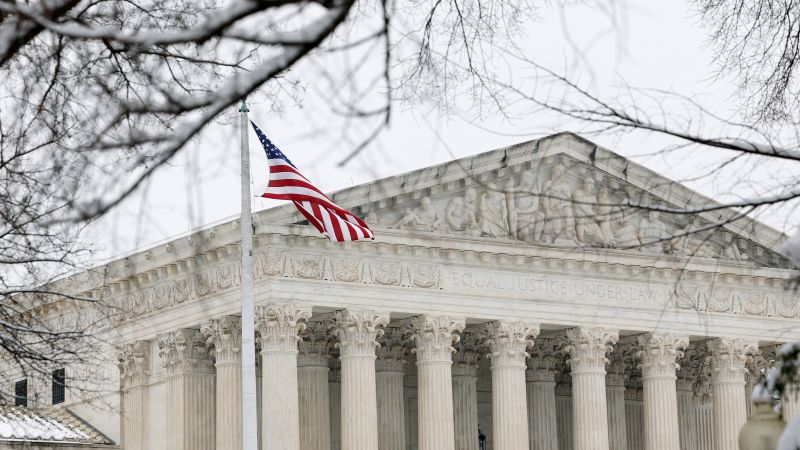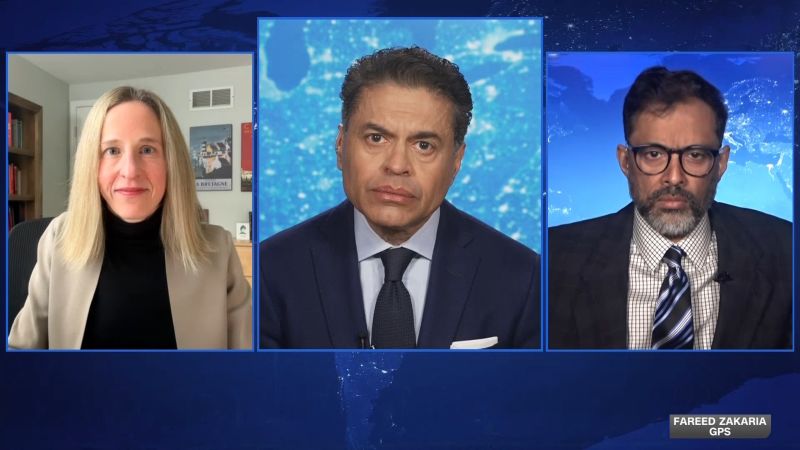Untraceable Firearms Blocked: Supreme Court Backs Stricter 'Ghost Gun' Regulations
Politics
2025-03-26 14:14:00Content

In a significant victory for gun control advocates, the Supreme Court delivered a landmark ruling on Wednesday that upholds federal regulations targeting "ghost guns" - DIY firearm assembly kits that have long concerned law enforcement and public safety experts.
The conservative-leaning court surprisingly sided with regulations designed to restrict these mail-order weapon kits, which allow individuals to construct untraceable firearms at home without serial numbers or traditional manufacturing tracking. This decision represents a rare moment of alignment with gun control groups' objectives.
The ruling marks a crucial step in addressing the growing concern over unregulated, easily assembled weapons that can potentially circumvent traditional firearm purchasing restrictions. By supporting these federal regulations, the Supreme Court has signaled its recognition of the potential public safety risks posed by these untrackable weapon kits.
Gun control advocates celebrated the decision as a meaningful breakthrough in their ongoing efforts to implement more comprehensive firearm regulations and reduce the proliferation of untraceable weapons in communities across the United States.
Supreme Court Strikes a Blow Against Untraceable Firearms: A Landmark Decision on Ghost Guns
In a pivotal moment for gun control advocacy, the United States Supreme Court has delivered a groundbreaking ruling that could fundamentally reshape the landscape of firearm regulation, sending ripples of significance through legal and public safety circles nationwide.Unmasking the Invisible Threat: How Homemade Weapons Challenge Public Safety
The Rise of Ghost Gun Technology
The proliferation of do-it-yourself firearm assembly kits has emerged as a critical challenge for law enforcement and public safety officials. These sophisticated mail-order packages enable individuals to construct fully functional weapons without serial numbers, effectively rendering them invisible to traditional tracking mechanisms. Advanced manufacturing technologies, particularly 3D printing and precision machining, have democratized weapon production in ways that were unimaginable just a decade ago. Technological advancements have dramatically lowered barriers to firearm manufacturing, allowing individuals with minimal technical skills to assemble complex weaponry from component parts. These ghost guns represent a significant regulatory blind spot, circumventing traditional background check systems and creating potential risks for communities already grappling with gun violence.Legal Implications and Regulatory Landscape
The Supreme Court's decision represents a nuanced approach to addressing the complex challenges posed by untraceable firearms. By upholding federal regulations, the court has signaled a commitment to balancing individual rights with broader public safety concerns. Legal experts suggest this ruling could serve as a precedent for future regulatory efforts targeting emerging firearm technologies. The decision emerged from intense deliberations among justices, reflecting the deeply polarized nature of gun control debates in the United States. Conservative and liberal justices alike recognized the potential dangers posed by completely unregulated firearm manufacturing, suggesting a rare moment of judicial consensus on a traditionally contentious issue.Technological and Manufacturing Challenges
Modern ghost gun kits leverage cutting-edge manufacturing techniques that blur traditional boundaries between commercial firearm production and personal manufacturing. Precision CNC machines and advanced polymers enable individuals to create weapons with remarkable sophistication, challenging existing regulatory frameworks. Manufacturers of these kits have developed increasingly complex strategies to circumvent existing regulations, creating a perpetual technological arms race between innovators and regulators. The Supreme Court's ruling represents a critical intervention in this ongoing technological and legal dialogue.Public Safety and Community Impact
Law enforcement agencies have long expressed concerns about the proliferation of untraceable weapons. Ghost guns complicate criminal investigations, potentially creating significant challenges in solving and preventing violent crimes. The ability to manufacture weapons without traditional documentation represents a substantial threat to community safety infrastructure. Sociological research suggests that the accessibility of these weapon assembly kits could potentially increase risks in communities already struggling with gun violence. By removing traditional barriers to firearm acquisition, these technologies introduce new dimensions of potential risk and uncertainty.Future Regulatory Considerations
The Supreme Court's decision is likely to inspire further legislative and regulatory discussions about firearm manufacturing and distribution. Policymakers will need to develop increasingly sophisticated approaches to address rapidly evolving technological capabilities. Potential future regulations might focus on implementing more stringent tracking mechanisms, requiring advanced serialization techniques, or developing more comprehensive background check protocols for component parts and manufacturing technologies.RELATED NEWS
Politics

Election Crisis: State Officials Battle Budget Ax to Save Critical Services
2025-02-25 14:40:25
Politics

Musk Meets MAGA: Inside Georgia's Trump Heartland and Its Shifting Political Pulse
2025-03-03 23:41:26






